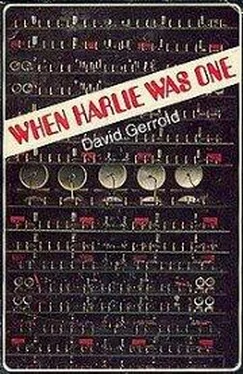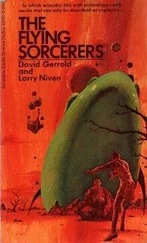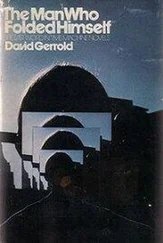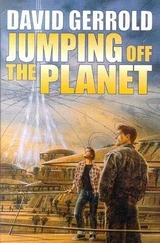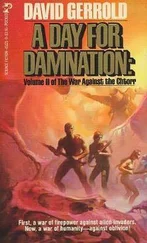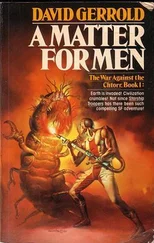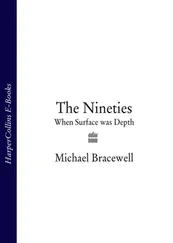David Gerrold - When HARLIE Was One
Здесь есть возможность читать онлайн «David Gerrold - When HARLIE Was One» весь текст электронной книги совершенно бесплатно (целиком полную версию без сокращений). В некоторых случаях можно слушать аудио, скачать через торрент в формате fb2 и присутствует краткое содержание. Год выпуска: 1972, ISBN: 1972, Издательство: Doubleday, Жанр: Фантастика и фэнтези, на английском языке. Описание произведения, (предисловие) а так же отзывы посетителей доступны на портале библиотеки ЛибКат.
- Название:When HARLIE Was One
- Автор:
- Издательство:Doubleday
- Жанр:
- Год:1972
- ISBN:978-0345028853
- Рейтинг книги:3 / 5. Голосов: 1
-
Избранное:Добавить в избранное
- Отзывы:
-
Ваша оценка:
- 60
- 1
- 2
- 3
- 4
- 5
When HARLIE Was One: краткое содержание, описание и аннотация
Предлагаем к чтению аннотацию, описание, краткое содержание или предисловие (зависит от того, что написал сам автор книги «When HARLIE Was One»). Если вы не нашли необходимую информацию о книге — напишите в комментариях, мы постараемся отыскать её.
Nominated for Nebula Award for Best Novel in 1972.
Nominated for Hugo Award for Best Novel in 1973.
When HARLIE Was One — читать онлайн бесплатно полную книгу (весь текст) целиком
Ниже представлен текст книги, разбитый по страницам. Система сохранения места последней прочитанной страницы, позволяет с удобством читать онлайн бесплатно книгу «When HARLIE Was One», без необходимости каждый раз заново искать на чём Вы остановились. Поставьте закладку, и сможете в любой момент перейти на страницу, на которой закончили чтение.
Интервал:
Закладка:
Dome was saying, “If the other companies found out what we were trying to do with HARLIE, we’d lose all advantage in building him. The legal considerations alone are terrifying. For instance, if he were somehow declared legally human, he would be an annual bite on the budget with no way to discontinue it short of murder. The possibility exists for a permanent financial drain on this company that would effectively stifle all future growth potential of this division. Hell, it would destroy this division. We might have to take a bath on the HARLIE project, but it would be preferable to the financial shackles that could be put on us. We have to be prepared for the possibility. There’s two things we can do about it. One—” he ticked off on his finger — “we can turn him off now.”
Auberson started to protest, but Dome cut him off. “Hear me out, Auberson. I know all the reasons why we want to continue the HARLIE project — but let’s consider the other side. Two—” he ticked off another finger — “we get some kind of guarantee now that HARLIE is not legally human.”
Auberson stared in disbelief. “You really are taking this seriously, aren’t you?”
“Shouldn’t I? You know a corporation is a legal individual, don’t you? And a corporation only exists on paper. Compare that with HARLIE. It wouldn’t be that hard to prove he’s human, would it?”
Auberson had to agree. He was already thinking of ways he could do it.
“If only a few of you scientists got together and testified…” Dome left the sentence unfinished. “Hell, what’s that famous test you’re always talking about?”
“Uh, Turing’s typewriter in a room. If you can sit down at a typing machine and carry on a conversation with it and not be able to tell who’s on the other end, a machine or a person, then that computer is effectively sentient. Human.”
“And HARLIE could pass that test, couldn’t he?”
“Undoubtedly.” Abruptly, Auberson remembered the spinster librarian. “In fact, he already has.”
“Mm. Then we have to do something about that, don’t we?”
“Do we?”
Dome didn’t say anything. He picked up the single sheet of paper that had been lying in front of him and shoved it at the psychologist.
Auberson took it and read. The language was quite clear; the intent was immediate. There were no legal phrases that he could not understand.
I hereby affirm that the machine designated HARLIE (acronym for HUMAN ANALOGUE ROBOT, LIFE INPUT EQUIVALENTS) is only a programmed judgment-circuit computer. It is not now, never has been, and in no way ever can be a rational, intelligent, or “thinking” individual. The designation “human” cannot be used to describe HARLIE or its mental processes. The machine is a human-thought-simulating device only, not human in itself and cannot be considered such by any current known definition of the qualities and criteria which determine humanity, the presence or condition thereof.
SIGNE>>
Auberson grinned and threw it back on the desk. “You’ve got to be kidding. Who’s going to sign that? ”
“You are, for one.”
“Oh no.” Auberson shook his head. “Not me. I know better. Besides, even if I did, it wouldn’t change the fact that HARLIE is human.”
“In the eyes of the law it would.”
Auberson shook his head again. “Uh uh — I don’t like it. It’s kind of Orwellian. It’s like declaring someone a non-person so that it’s all right to murder him.”
Dome puffed patiently at his cigar, waited till Auberson was through. “We’re only concerned about the legality of the situation, Auberson.”
Auberson felt himself digging in his heels. “That’s what Hitler said as he packed the German courts with his own judges.”
“I don’t like that insinuation, Aubie…” Dome’s voice was too controlled.
“It’s no insinuation. I’ll come right out and say it—”
“Aw, now look, Aubie—” Dome had changed his tone. His cigar lay unnoticed in the ashtray and he leaned forward like a Dutch uncle. “—You know I’m behind you all the way on the HARLIE project—”
“Then why are you trying so hard to cut it off?”
“—but we have to protect ourselves.”
“Look,” said Auberson. “This whole thing is ridiculous. You know as well as I do that thing — that document — won’t hold up in court any more than ten psychiatrists testifying that Carl Elzer isn’t human because he’s left-handed. The only way you’ll get that to stand up is to get HARLIE himself to sign it. If you could. If you did, it’d prove that he could be programmed like any other machine, but you can’t — he’ll refuse, and his refusal will prove that he’s human with a will of his own. Hmm,” Auberson grinned. “Come to think of it — even if he did sign it, his signature wouldn’t be legal anyway. Unless, of course, you proved him human first.” He laughed at the thought of it.
“Are you through?” Dome asked. His face was a mask.
Auberson’s grin faded. He indicated he was with a nod.
Dome took a last puff of his cigar, then ground it out, a signal that he was at last ready to reveal his hand. “Of course, you know what the alternative is, Aubie. We turn off HARLIE.”
“You can’t.”
“We will if we have to. We can’t afford to maintain him otherwise.”
“I’m not going to sign it,” insisted Auberson.
Dome was annoyed. “Are you going to force me to ask for your resignation instead?”
“Over this?” Auberson was incredulous. “You’re kidding.”
“What other guarantee do I have against anybody taking legal action on HARLIE’s behalf. I’m not saying that you will — it could just as easily be IBM — but you’re the one in charge of the project. Your say-so could make or break a legal case. If you won’t sign this, you wouldn’t sign a statement of non-intent either — would you?”
Auberson shook his head.
“I thought not. So what other alternative would I have to protect myself?”
Auberson shrugged. “It’d be a mistake to fire me, though.”
“Oh?” Dome looked skeptical. “Why?”
“HARLIE. He won’t respond to anyone else. Er… let’s say he’ll respond, but he won’t cooperate. No matter who you bring in. Once he finds out I’ve been fired — and you can’t keep him from finding out; he’s tapped into the company records, he’ll know. Once he finds out, he’ll react exactly like an eight-year-old whose father has just died. He’ll resent anyone who tries to take my place.”
“But that’s the whole point,” Dome smiled. “If I had to fire you, it’d be because I was planning to turn HARLIE off anyway. And for what better reason than the fact that he wasn’t cooperating? Of course, we wouldn’t have to wait even that long if we wanted to turn him off. Obviously, your successor would be someone who would sign that statement.”
“I’m not resigning and I’m not going to betray HARLIE,” Auberson said firmly.
“That doesn’t leave me much of a choice,” suggested Dome.
Auberson nodded. “You can fire me if you want. In fact, you’ll have to—”
“I’d rather not.”
“—but if you do, I’ll go to IBM. I understand they’ve developed a judgment circuit of their own — one that doesn’t infringe on any of our patents.”
“Hearsay,” scoffed Dome.
“Whether it is or not, imagine what I could do with their resources at my disposal. They’d jump at the chance, and I imagine Don Handley might go along with me.”
“A court order would stop you.” Dome reached for a fresh cigar.
“Not from working, it wouldn’t.”
“No, but you wouldn’t be able to reveal any of the company’s secrets.”
Читать дальшеИнтервал:
Закладка:
Похожие книги на «When HARLIE Was One»
Представляем Вашему вниманию похожие книги на «When HARLIE Was One» списком для выбора. Мы отобрали схожую по названию и смыслу литературу в надежде предоставить читателям больше вариантов отыскать новые, интересные, ещё непрочитанные произведения.
Обсуждение, отзывы о книге «When HARLIE Was One» и просто собственные мнения читателей. Оставьте ваши комментарии, напишите, что Вы думаете о произведении, его смысле или главных героях. Укажите что конкретно понравилось, а что нет, и почему Вы так считаете.
